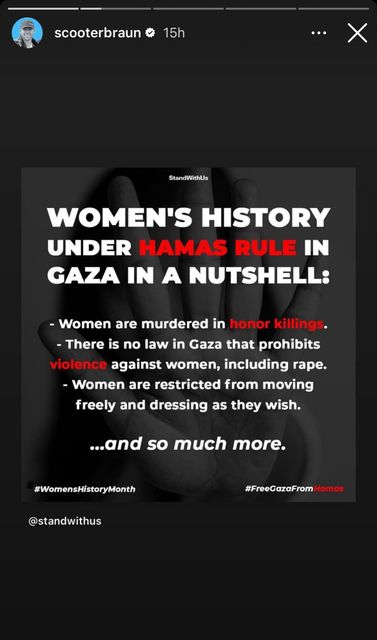HYBE America CEO Scooter Braun Slammed By Fans Over Instagram Post About Women In Gaza

Content Warning
Scooter Braun, the CEO of HYBE’s American subsidiary, has come under fire once again for an Instagram post that many netizens critiqued as perpetuating Islamophobic stereotypes.

In the wake of the ongoing violence in the Gaza Strip by Israel, which the International Court of Justice has found a “plausible genocide” (according to a United Nations report), pro-Palestinian movements have also budded in the K-Pop fandom space. An intersection of the HYBE fandoms has spearheaded collective actions like promoting grassroots organizations that provide aid in Gaza and advocating for the rights of the persecuted population. Currently, this group of people is organizing efforts to push HYBE to remove Scooter Braun, owing to his staunch Zionist standpoint.
scooter posting israeli propaganda about a girl “died”
who, in reality is very much alive and says the iof airstrikes killed her friends pic.twitter.com/m4URAfNKeB— (winnie the) rooh⁷ boycott info 📌 (@btsprodsuga) February 13, 2024
Fans have taken issue with Braun propagating dehumanizing narratives about Palestinian civilians and have constantly tried to have their voices heard by HYBE through efforts like trending the hashtag #HYBEDivestFromZionism, petitioning, organizing protest trucks, and even boycotts. But so far, the company has not responded to these demands, except for a brief statement through a third-party media outlet, which invited widespread criticism online.
i see many people giving up because they think this is impossible to achieve, but we won't know unless we keep trying.
only a little over 10,000 signs left until this petition reaches its goal. if everyone signs it, we'll be able to reach it really soon: https://t.co/2DYbdf7I3I
— TXT Translations 💬 (@translatingTXT) March 2, 2024
Many believe that Braun has tacitly responded to this ongoing movement through different avenues, be it reaching out to fan accounts in person or making posts on his own account. One of his latest Instagram stories has offended a large section of the HYBE fanbases for perpetuating harmful stereotypes against Palestinian women. The story in question included a post from an Instagram account dedicated to “supporting Israel around the world,” which implied that women in Gaza are perpetually oppressed “under Hamas rule.”

The post immediately attracted criticism that was multi-fold. Firstly, many felt that it portrays the stereotypical image of Muslim women being oppressed by their own faith for not meeting the Western standards of liberation.
they took a bunch of islamophobic stereotypes about muslim women, strung them all together, slapped “KHamAs” on them, and he posted that on his story with perfect peace of mind, this is wonderful
blatant misogyny and racism, but it’s “personal beliefs” let’s not panic https://t.co/7cXEPy2z06
— louz⁷⁼¹⭐️³ᴰ(ꪜ)🪐🥢🪞🦋🪻👩🏽🚀🃏 (@nagwon42195) March 4, 2024
y’all okay with islamophobia and white men perpetuating severely harmful misrepresentations of a different culture? @HYBEOFFICIALtwt is this still just a personal statement?#HYBEDivestFromZionism #하이브는시오니스트를퇴출하라 https://t.co/OcLJYDzG55
— cam⁷ ! 🍉 (@seokfilmz) March 5, 2024
Scooter braun is freely posting Islamophohic things on his IG and you let him hide behind you @HYBEOFFICIALtwt ??? How are you letting an openly islamophobe work in your company ? #하이브는시오니스트를퇴출하라 #HybeDivestFromZionism https://t.co/U9s0Xr5KBi
— Sadia⁷ 아포방포 (@ughdilfs) March 5, 2024
Secondly, many found it disagreeable that Braun promoted a post that only weaponized the suffering of women in Gaza to perpetuate Zionism while altogether omitting the fact that those same women are subjugated to alarming humanitarian crises because of Israel’s ongoing blockade of aid into the Strip.
How dare you talk about women's history under ANY rule at all when the people you support have made it so that women have to give birth without anaesthesia is Gaza. How dare you. This man is a literal piece of shit and that's a nice thing to say about him. pic.twitter.com/S1z7Rl2zyd
— roses ⁷ kinda ia (@namgiiist) March 5, 2024
and nothing about how women in Gaza are forced to use tent scraps and garbage as period products? How miscarriages are on the rise due to such high stress? How women are unable to breastfeed their own babies? How women are subject to abuse by the iof?
HYBE REMOVE SCOOTER BRAUN https://t.co/0R8pZFmxK6— pete⁷ (@greeniefish) March 5, 2024
the dehumanisation of Palestinian people that this story holds
the same manipulative and twisted narrative
the blatant instrumentalization of Palestinian women’s suffering as a way to spread once more his disgusting propagandawe need this man OUT https://t.co/SvpBmgjmkl
— sen⁷ (@taehyungoofy) March 4, 2024
While the women’s rights situation is far from being utopian in Gaza, the post re-shared by Braun does appear to have some factual fallacies. Gaza does have laws for women, including legal provisions against rape. According to a 2019 report by the United Nations Development Program (UNDP), “Palestine unilaterally ratified CEDAW (Convention on the Elimination of All Forms of Discrimination against Women) by Presidential Decree No. 19 of 2009. After the UN recognition of Palestine as a State, Palestine acceded to CEDAW in 2014. Palestine has entered no reservations to CEDAW.”
The same report mentions that there are legal prohibitions against rape, both in Gaza and the West Bank.
Rape is criminalized by Article 152 of the Criminal Code of 1936 in the Gaza Strip and Article 292 of the Penal Code of 1960 in the West Bank.
— UNDP
However, marital rape is not recognized as a crime in either territory.
Though abortion is prohibited in the West Bank by the Jordan Penal Code (Articles 321–325) and in Gaza by the Criminal Code of 1936 (Articles 175–177), in practice, authorities are said to allow abortions in the first four months of pregnancy in situations of rape or incest, or if the mother has a disability or her life is at risk.
Additionally, the Labour Law of 2000 prohibits discrimination between men and women in the workplace and protects a woman from being dismissed by her employer for taking maternity leave. Both these laws were mentioned to be functional in the 2019 UNDP report.
While these legal provisions might not see a perfect execution on the ground, many found it disingenuous to criticize Hamas when the post failed to acknowledge Israel’s public involvement in violence against women in Gaza, much of which is spread online by the state’s own soldiers. Women’s liberation, as pointed out by many of Braun’s critics, cannot come to fruition when the entire population of the Gaza Strip is fighting for mere survival in the face of disproportionate violence, sexual humiliation, and famine.
Beit Lahia |
Inside a home in north Gaza last month.
The not-shocking part is that the one playing with the bra belonging to a displaced/killed Palestinian woman is their military commander with a rank of a captain in the Israeli military pic.twitter.com/YwOo1kCskt
— Younis Tirawi | يونس (@ytirawi) February 26, 2024
Gaza city |
Israeli soldiers from the paratrooper brigades playing with underwear belonging to Palestinian women they displaced/killed. pic.twitter.com/lyTZ2UhPXn
— Younis Tirawi | يونس (@ytirawi) March 4, 2024
Scooter Braun continues his support for the genocide despite the fates of women in Gaza, and their children, at the hands of the occupational forces
Scooter Braun should resign
REMOVE SCOOTER BRAUN FROM HYBE AMERICA#HYBEDivestFromZionism #하이브는시오니스트를퇴출하라 https://t.co/pj18vuUVGZ pic.twitter.com/fuRTgqRfMf— liliana💜아미⁷⁼¹🔔BELL ERA REDUX🔔 (@Lilyurscealai) March 4, 2024
someone tell scooter to post about what gazan women and young girls have been going through under israel’s oppression if he wants to play “both sides” so bad
— 🇵🇸 (@iconpjms) March 5, 2024
.@hitmanb
scooter spews this nonsense but says nothing about palestinian women being abused by idf soldiers, being denied necessary hygiene products, being starved and bombed by israel! this is blatant islamophobia and misogyny#하이브는시오니스트를퇴출하라 #HYBEDivestFromZionism pic.twitter.com/sKpIHJEG7t— 𐐪♡𐑂 (@angel_jjunie) March 4, 2024
Additionally, multiple reports testify that Palestinian women’s rights are not safeguarded in the Israeli territories either, which begets the question of how valid Braun and the original poster’s criticism is.
Israeli occupation soldiers subject #Palestinian schoolgirls to a humiliating body search on their way to school in the occupied Jerusalem neighborhood of Shufat. pic.twitter.com/NavxlitVg3
— Quds News Network (@QudsNen) November 8, 2023
A glimpse into apartheid #Israel : soldiers abusing older #Palestinian women at checkpoints likely not being allowed to go pray or visit. This is daily life at the hand of their racist occupiers
Who can tolerate this! pic.twitter.com/DNpkrSGsql— ali hadi (@alihadi68) March 3, 2024
🇺🇳UN report just released shows Israel has kidnapped women, held women in cages, stripped them naked and released footage online, severely beat women, and raped women in the occupied West Bank…🇵🇸💔https://t.co/ThaFlWC7OK pic.twitter.com/JNpzhNs8qs
— Pelham (@Resist_05) February 21, 2024
Finally, many fans who got vocal against Scooter Braun’s post also highlighted that the post failed to acknowledge that Gaza is home to many female powerhouses, including heroes like Dr. Amira Al Asouli, journalists Hind Khoudary, Plestia Alaqad, and Bisan Owda, who are important representatives of Women’s History and their present in the region.
This is woman’s history month in Palestine.#FreePalestine https://t.co/cqK47Tr0eD pic.twitter.com/i9HQfcs2RQ
— lua⁷ ☭ 🍉👩🏽💻 (@intro_lua) March 5, 2024
People of the year.
Plestia Alaqad.
Motaz Azaiza.
Hind Khoudary.
Bisan Owda. pic.twitter.com/mb0CHZ9cIb— nadira (@nadirawrites) December 6, 2023